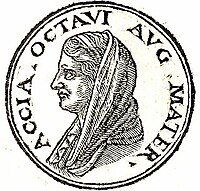Atia Balba Caesonia
| Atia | |
|---|---|

Atia Balba Caesonia from "Promptuarii Iconum Insigniorum"
|
|
| Born | 85 B.C. |
| Died | August 43 B.C. (aged c. 42) |
| Spouse |
Gaius Octavius Lucius Marcius Philippus |
| Issue |
Octavia Minor Gaius Julius Caesar Augustus, Emperor of Rome |
| Father | Marcus Atius |
| Mother | Julia Minor |
Atia (also Atia Balba or Atia Balba Caesonia) (85 BC – 43 BC) was the daughter of Julius Caesar's sister Julia Minor, mother of the Emperor Augustus, step-grandmother of the Emperor Tiberius, great-grandmother of the Emperor Claudius, great-great grandmother of the Emperor Caligula and Empress Agrippina the Younger, and great-great-great-grandmother of the Emperor Nero.
The name Atia Balba was also borne by the other two daughters of Julia and her husband praetor Marcus Atius Balbus. They were Atia’s older sister Atia Balba Prima, and her younger sister was Atia Balba Tertia. As a result, she was sometimes referred to as Atia Balba Secunda to differentiate her from her two sisters. In former portrayals of the ancient history the mother of Augustus, Atia, was still described as the elder of two sisters.
In his Dialogus de oratoribus, Tacitus notes her to be exceptionally religious and moral, and one of the most admired matrons in the history of the Republic:
In her presence no base word could be uttered without grave offence, and no wrong deed done. Religiously and with the utmost delicacy she regulated not only the serious tasks of her youthful charges, but also their recreations and their games.
Suetonius' account of Augustus mentions the divine omens she experienced before and after his birth:
When Atia had come in the middle of the night to the solemn service of Apollo, she had her litter set down in the temple and fell asleep, while the rest of the matrons also slept. On a sudden a serpent glided up to her and shortly went away. When she awoke, she purified herself, as if after the embraces of her husband, and at once there appeared on her body a mark in colours like a serpent, and she could never get rid of it; so that presently she ceased ever to go to the public baths. In the tenth month after that Augustus was born and was therefore regarded as the son of Apollo. Atia too, before she gave him birth, dreamed that her vitals were borne up to the stars and spread over the whole extent of land and sea, while Octavius dreamed that the sun rose from Atia's womb. (Suetonius:94:4)
...
Wikipedia
